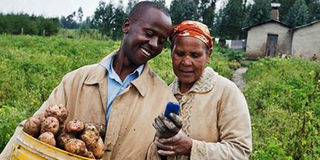Use of modern technologies will boost agriculture

Farmers use a mobile phone to get market information. Modern information and communication technologies are increasingly being utilised to improve farming as a business.
While a number of challenges exist, there are several opportunities in using modern information and communication technologies (ICTs) to improve farming operations.
This was the general agreement at the Vodafone Power Talk, which was held in Kampala last Thursday July 30.
A good mix
The event, which was the second in a series of such engagements organised by Vodafone Uganda, attracted farmers, representatives of farmers’ organisations, entrepreneurs, decision makers, academia, as well as agricultural and ICT experts.
The mix of speakers tackled the issues involved or encountered and best practices to adopt in improving agricultural value chains and agribusiness.
While the first Power Talk covered how small and medium enterprises can use the internet to grow their business, the theme for the second one was “Enhancing Agricultural production through ICT”.
Organised to ensure as much as interaction as possible, there were presentations by the panellists interlaced with moderated questions-and-answers sessions.
The main speakers were: Robert Kintu, the managing director, FIT Uganda, Ronald Katamba, from Afrosoft IT Solutions, Stuart Oramire, the director of operations, Agency for Transformation, Maggie Kigozi, the former executive director, Uganda Investment Authority, and Victoria Sekitoleko, the chairperson, Uganda Agribusiness Alliance and also a former Agriculture minister.
Leverage ICTs
In his presentation on the topic, Production data influencing growth in the agribusiness sector, Mr Kintu covered the importance of data collection and produce tracking in farming as a business, the use of mobile and online applications and the role of mobile network operators in agriculture.
The highlight of Mr Katamba’s presentation was the Jaguza app. It is a mobile phone and online application which allows farmers to automatically monitor their livestock, that is, cattle, goats, pigs, rabbits and sheep. It has real-time reporting of disease outbreaks and health condition of the animals and monitoring things like feeds.
Mr Oramire’s topic “How agricultural entrepreneurs can leverage the power of ICTs to grow their business” also touched on challenges inherent in integrating ICTs in agriculture. He also indicated the way forward in countering these challenges.
Ms Kigozi’s was sharing of experiences in use of ICTs in farm operations. Her Zuri Farm operates a mixed model.
A lot of opportunities
There are trees, maize, coffee, bananas, soya bean, pepper, chillies and chickens. The ICT operations include use of mobile money and a website.
Finally, the last speaker Ms Sekitoleko wrapped up with the evolution of ICTs, from simple technologies like telegrams and letters to mobile phones and computers.
Using the context of her background and being involved in agriculture at various levels including making policy, she indicated that there were opportunities for farmers to improve their business with ICTs.




